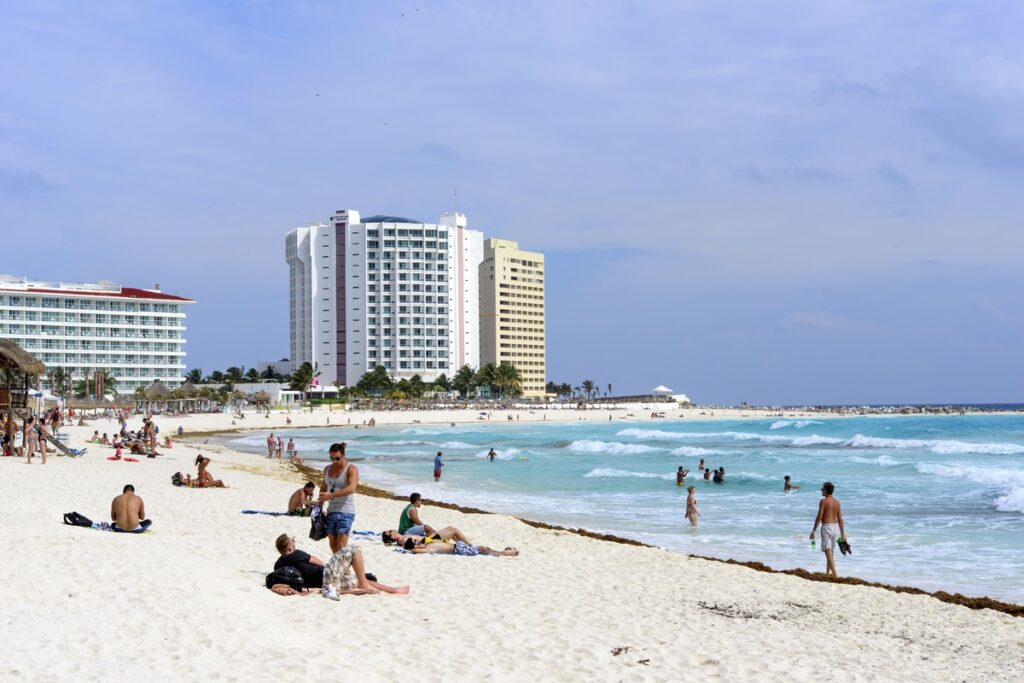No products in the cart.
Travel Guide
Los Cabos And Cancun At Level 2 Travel Advisory Heading Into The Fall
Last Updated
Heading south of the border this fall?
You may have seen the U.S. Department of State has issued updated travel advisories for each individual Mexican destination this fall. While security risks in places like Puerto Vallarta are considered high enough to warrant a Level 3 badge, meaning Americans should ‘reconsider travel‘ due to crime and even kidnapping risks, others like Cabo and Cancun remained at a much safer Level 2.

Mexico is the number one destination for Americans going abroad. Boasting a pristine coastline extending for miles on end, some of the best preserved pre-Columbian sites in all of the Americas, and home to one of the world’s richest, and most diverse cuisine, it definitely deserves its hard-earned title of King of Tourism.
On the downside, its recent run-ins with the law have been a cause for concern, particularly among first-time visitors. Luckily, that’s not the case with America’s favorites Cabo and Cancun:
Is Mexico A Safe Place To Visit?

Before anything else, we should probably point out Mexic is pretty safe to visit. There is a reason the country has been smashing tourism records lately, with Los Cabos even outpacing majority of beach destinations in the wider region in terms of tourism growth. Yes, crime can occur, but in any tourist setting, chances are slim.
Although we cannot disregard the warnings coming from the United States Government, seeing that they are official and data-informed, we should note an ‘increased risk’ of crime is merely that: a risk. It does not mean it will happen, or that it will affect Americans in Mexico. In fact, the vast majority of them will experience a trouble-free vacation.

Tourists Should Exercise Increased Caution Visiting Cabo And Cancun
That being said, the U.S. has nevertheless granted a Level 2 status to the Baja California Sur and Quintana Roo states, of which Los Cabos and Cancun are a part of. In simpler terms, these destinations are not under a particularly high threat of crime, or are turf war hotspots, like other Level 3, or even Level 4 ‘No Travel’ cities.
As per the department’s statement, U.S. citizens should only ‘exercise increase caution’ in the region due to crime, a warning that, in reality, applies to every single major international destination. Unlike in the states of Jalisco or Sinaloa, there are currently ‘no restriction’ on travel for U.S. Government employees based in Baja California Sur, or even tourists.

Similarly, Quintana Roo – and the Riviera Maya on an extent – has not been blacklisted by the department, featuring on the same Level 2 list as Cabo. All of the Mexican Caribbean’s consolidated stars, namely Cancun, Tulum, Playa del Carmen, Isla Mujeres and Chetumal are not deemed seriously dangerous for tourists.
The advisory mentions ‘criminal activity and violence may occur in any location, at any time, including in popular tourist destinations‘, but then again, this same advice could be replicated for numerous countries, including the U.S., where pick-pocketing and illicit activities have long posed a problem (especially in New York, L.A., and other large cities).

Naturally, minor incidents cannot be ruled out, and while this is far from being exclusive to Cabo or Cancun, like anywhere else, visitors must not let their guards down when flying abroad. In fact, maintaining a high level of situational awareness is key to a stress-free vacation in the Riviera Maya and Cabo’s Pacific Coast.
Essentially, Americans must observe all of these rules:
- Avoid walking after dark in poorly-lit pedestrian zones
- Refrain from visiting by yourself peripheral districts of Cancun or Cabo that do not normally receive a lot of tourists
- ‘Promptly depart’ from areas where dangerous events are unfolding, however rare
- Constantly checking the U.S. Department of State web-page for all the latest updates on travel to Cancun
*Personally, we would recommend not flashing jewelry or other expensive belongings that may attract thieves
Bottomline

Realistically, tourists should not feel as if they have a target on their backs traveling in Cabo or Cancun. At the same time, exercising caution when abroad, whether it’s Mexico or elsewhere, is of paramount importance. In Mexico specifically, violent incidents are not directed at visitors, but they can still be injured finding themselves in the wrong place, wrong time.
At the same time, you probably risk getting robbed strolling alone after sundown in New York, as well. Sod’s law.
Once again, the occasions in which tourists are harmed, or witness acts of violence, are incredibly rare. Additionally, the Mexican Government takes tourism very seriously, and has clamped down on crime lately by deploying more police to tourist areas and ensuring Americans feel safe when vacationing in Cabo or Cancun.

In comparison, tourists should ‘reconsider travel’ to Puerto Vallarta and the whole state of Jalisco, which has been placed under the Level 3 listing, only one step short of being blacklisted by the Federal Government. In essence, despite these warnings, the states of Baja California Sur and Quintana Roo are considered much safer for travel than Jalisco, for example.
Visiting Mexico soon?
- Follow the official advice and plan your itinerary accordingly, making sure you cross out blacklisted regions
- Pre-book transfers between the airport and your hotel, or in between municipalities, in order to avoid Mexico’s infamous taxi scams
- Call 911, Mexico’s national emergency number whenever in need, especially when finding yourself in a dangerous situation
- Of course, don’t forget to enjoy your sunny getaway!
Read More:
Travel Insurance That Covers Covid-19 For 2022
U.S. Issues Mexico Travel Advisory After Multiple Cities Come Under Attack
3 Popular Beaches In Mexico Considered Unsafe For Swimming Due To Bacteria
Mexico Will Have 11 New Tourist Train Routes With The First Launching In 2023
Frontier Announces 5 New Non Stop Flights To International Destinations Starting At $69
This article originally appeared on Travel Off Path. For the latest breaking news that will affect your next trip, please visit: Traveloffpath.com
↓ Join the community ↓
The Travel Off Path Community FB group has all the latest reopening news, conversations, and Q&A’s happening daily!

SUBSCRIBE TO OUR LATEST POSTS
Enter your email address to subscribe to Travel Off Path’s latest breaking travel news, straight to your inbox
Disclaimer: Current travel rules and restrictions can change without notice. The decision to travel is ultimately your responsibility. Contact your consulate and/or local authorities to confirm your nationality’s entry and/or any changes to travel requirements before traveling. Travel Off Path does not endorse traveling against government advisories
Source link

